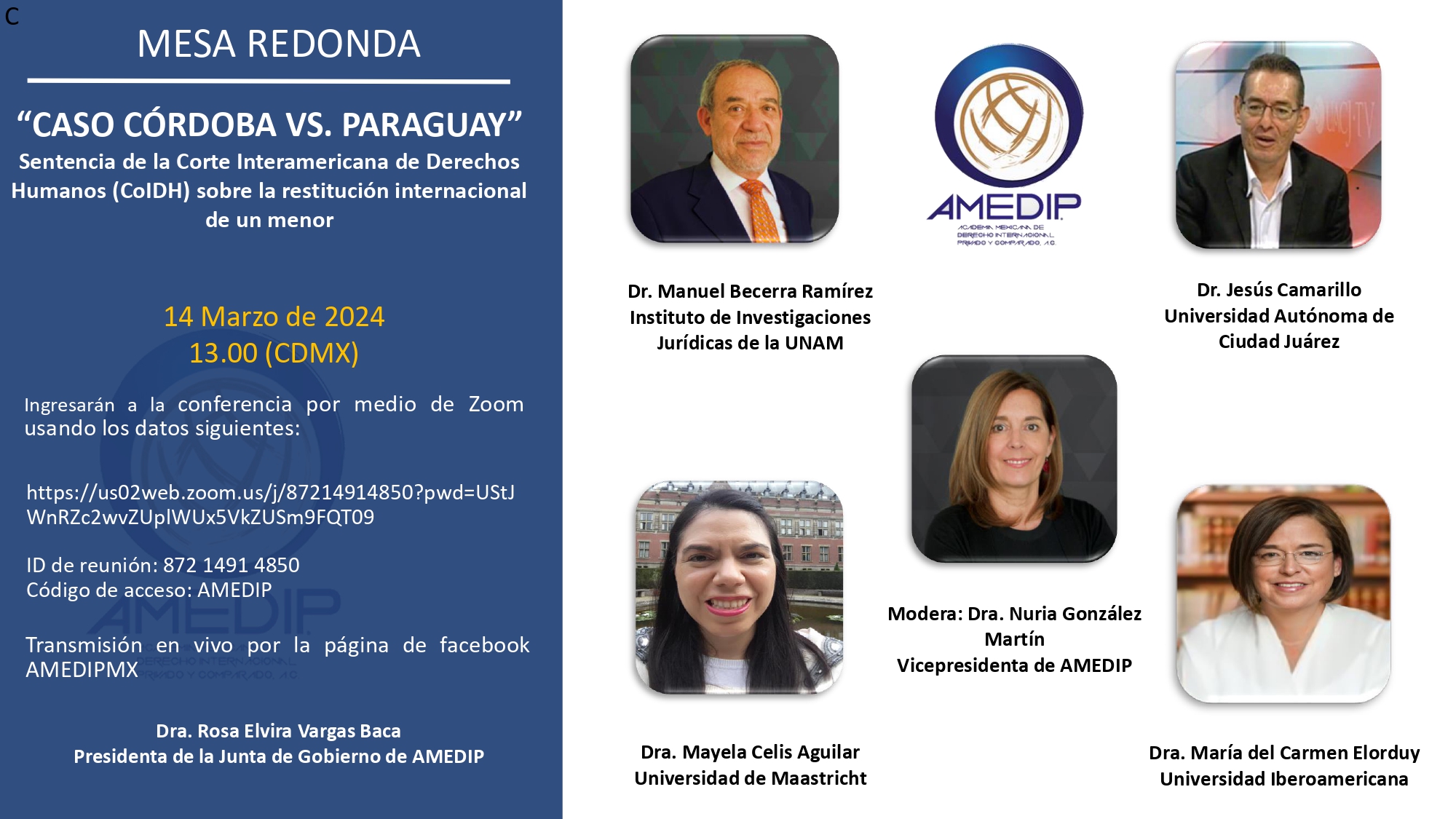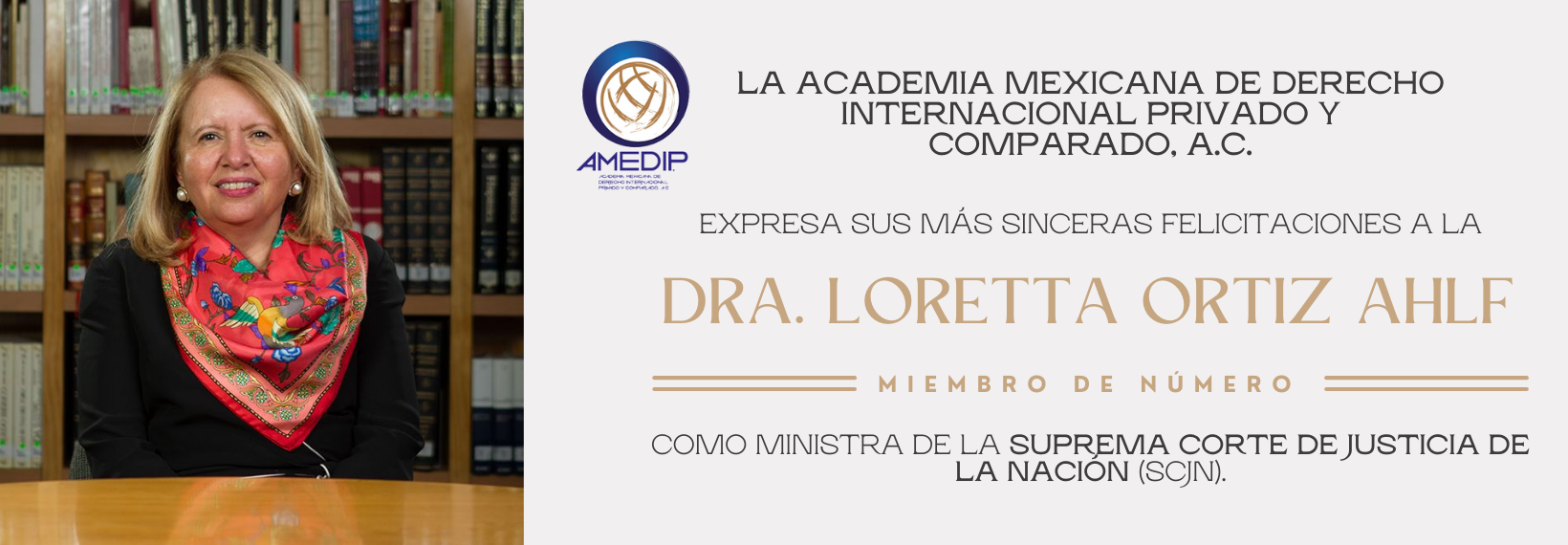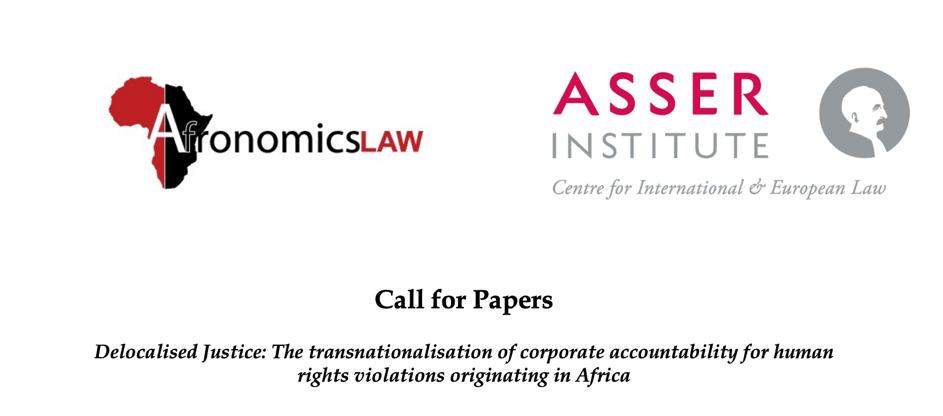Guest post by Janaína Albuquerque, International Lawyer and Mediator
The Inter-American Court of Human Rights (IACtHR) has just published their first ever judgment on an international child abduction case in Córdoba v. Paraguay, which concerns the illicit removal of a child who was habitually resident in Argentina. The applicant and left-behind parent, Mr. Arnaldo Javier Córdoba, claimed that Paraguay violated his human rights by failing to enforce the return order and ensuring the maintenance of contact with his son. At the time of the abduction, the child was about to reach 2 years of age and the taking parent relocated, without the father’s consent, to Paraguay.
Both Argentina and Paraguay are Contracting States to the American Convention on Human Rights (or Pact of San José) and the American Declaration of the Rights and Duties of Man, which are the main instruments assessed by the Inter-American Court and Commission. Paraguay has also accepted the Court’s jurisdiction in 1993. Differently from the European Court of Human Rights (ECtHR), applicants cannot present a request directly to the Inter-American Court. The petition must be firstly examined by the Inter-American Commission on Human Rights (IACHR), which will, then, issue recommendations or refer the case to the Court.
Apart from the abovementioned human rights instruments, the Inter-American framework also comprises the 1989 Convention on the International Return of Children. In accordance with Article 34, the referred treaty prevails over the 1980 Hague Convention on the Civil Aspects of International Child Abduction where the States involved are both Members of the Organisation of American States (OAS), unless otherwise stipulated by a bilateral agreement.
Although similar in content, the Inter-American Convention differs substantially from the Hague mechanism, particularly regarding jurisdiction. For instance, Article 6 states that it is the Contracting State in which the child was habitually resident before the removal or retention that has jurisdiction to consider a petition for the child’s return, indicating that the Contracting State in whose territory the abducted child is or is thought to be only has jurisdiction if the left-behind parent choses so and in urgent cases. Another core change is found in Article 10, which prescribes that, if a voluntary return does not take place, the judicial or administrative authorities shall forthwith meet with the child and take measures to provide for his or her temporary custody or care. The exceptions to the return are in a different order than the Hague Convention, but remain relatively the same in practice, with minor changes to the wording of the provisions.
In Córdoba v. Paraguay, the applicant filed the petition on 30 January 2009. During the time that the merits were being assessed by the Commission, the applicant presented two requests for precautionary measures and only the second one was adopted by the Resolución nº 29/19 on 10 May 2019. The case was finally referred to the Court 13 years after it was initiated, on 7 January 2022. Public hearings were held on 28 April 2023 and Reunite (United Kingdom), as well as the legal clinics of the Catholic University Andrés Bello (Venezuela) and the University of La Sabana (Colombia) participated in the proceedings as Amicus Curiae.
Restitution efforts in Paraguay
As regards the restitution efforts, the left-behind parent seized the Argentinian Central Authority on 25 January 2006, 4 days after the abduction took place. The dossier was received by the Paraguayan counterpart on 8 February 2006. Thereafter, judicial cases were brought both to the Juvenile Courts of Buenos Aires, in Argentina, and of Caacupé, in Paraguay. The return proceedings were carried out in the latter.
The taking parent argued the grave risk exception due to a history of physical and psychological domestic violence. Nevertheless, the Caacupé court ordered the return of the child. The taking parent appealed, claiming, furthermore, that the child suffered from a permanent mental condition. The Court of Appeal and the Supreme Court of Paraguay confirmed the first judgment. A ‘restitution hearing’ was scheduled to take place on 28 September 2006, but the taking parent did not attend.
Paraguayan authorities conducted searches for the taking parent and the child between the remainder of 2006 and 2009, which were unsuccessful. The child was eventually located by INTERPOL on 22 May 2015, still in Paraguay, at the city of Atyrá. The taking parent was preventively detained and custody was granted to the maternal aunt. The Juvenile court also ordered a protective measure in order to establish a supervised and progressive contact arrangement with the father and the paternal family. The child refused to go near the left-behind parent, and the psychological team of the court concluded that it would be impossible to enforce the return order.
On 7 March 2017, the Public Defender’s Office filed a request to establish the child’s residence in Paraguay, which was accepted by the Juvenile court under the argument that 11 years had passed since the return order was issued and that other rights had originated in the meantime. Additionally, it was decided that, given the outcomes of the previous attempts, no contact would be established between the left-behind parent and the child. The Paraguayan Central Authority appealed and reverted the decision in regard to visitation, where it was stipulated that the left-behind parent should come to Paraguay to meet with the child. This arrangement was, then, confirmed by the Court of Appeal and, subsequently, by the Supreme Court.
In 2019, the Ministry of Childhood and Adolescence of Paraguay asked for an evaluation of the situation of the child. It was informed that the child had been receiving monthly psychological treatment; that he was living with his aunt and her husband; and that the mother visited him daily. Contrastingly, between 2015 and 2018, 4 visits had been organised with the father, in which 3 were accompanied by the paternal grandmother. A hearing was finally held on 23 May 2019, where the child expressed to the court that he did not want to be ‘molested’ by his father nor did he desire to maintain a bond with him.
Merits
On the merits, the IACtHR (hereinafter, ‘the Court’) noted that it would assess potential violations to Articles 5 (Right to Humane Treatment), 8 (Right to a Fair Trial), 11 (Right to Privacy), 17 (Rights of the Family), 19 (Rights of the Child) and 25 (Right to Judicial Protection) of the Pact of San José (‘the Pact’) in light of the application of the 1989 Inter-American Convention. References were also made to the complementary incidence of the United Nations Convention on the Rights of the Child, the 1980 Hague Child Abduction Convention and the 1996 Hague Child Protection Convention, as well as the General Comments nº 12 and 14 of the Committee on the Rights of the Child.
Initially, the Court remarked that, at the time of the case’s referral by the Commission, the child was about to turn 18 and that both the Inter-American and Hague Conventions were only applicable until the child reached the age of 16. It was noted, with concern, that the child had not been heard during most of the proceedings and that Article 12 of the UNCRC had been disregarded. As the child manifested that he did not feel like a victim and had no interest in pursuing his father’s claim, the Court decided to only assess the human rights violations suffered by Mr. Córdoba.
Regarding the violations of judicial guarantees and protection, the Court analysed the right to a reasonable timeframe and the State’s obligation to enforce judgments issued by competent authorities, accentuated by the particular condition of urgency required in proceedings involving children. An explicit reference was made to Maumousseau and Washington v. France inasmuch as the ECtHR concluded that, in international child abduction cases, the status quo ante must be re-established as quickly as possible to prevent the consolidation of illegal situations.
As the judicial proceedings for the return were concluded within 8 months, the Court did not find that there had been a violation of Article 8.1 of the Pact. However, Article 25.2.c prescribed that the State’s responsibility did not end when a judgment had been reached and that public authorities may not obstruct the meaning nor the scope of judicial decisions or unduly delay their enforcement (Mejía Idrovo v. Ecuador and Federación Nacional de Trabajadores Marítimos y Portuarios v. Perú). References to Maire v. Portugal and Ignaccolo-Zenive v. Romania from the ECtHR were also made to reinforce that such delays brought irreparable consequences to parent-child relationships. It had not been reasonable that the State of Paraguay, for 9 years, was not able to locate a child that regularly attended school and received care from the public health services. After the child was found, custody was immediately granted to the maternal aunt and contact with the father was hindered throughout the subsequent proceedings. Furthermore, the precautionary measures awarded by the Commission to instate a detailed visitation plan had not been enforced as a result of the COVID-19 pandemic, which contributed to the permanent deterioration of paternal bonds. Hence, the lack of diligence and morosity of the Paraguayan authorities resulted in a violation of Article 25.2.c of the Pact of San José.
In relation to the personal integrity, private and family life, and family protection, the Court focused on the assessment of Articles 11.2 and 17.1. It was firstly stated that arbitrary or abusive interferences to family life from third parties or the State are strictly forbidden, and that the latter must take positive and negative actions to protect all persons from this kind of conduct, especially if they affect families (Ramírez Escobar y otros v. Guatemala and Tabares Toro y otros v. Colombia). Secondly, it was asserted that the separation of children from their families should be exceptional and, preferably, temporary (Opinión Consultiva OC-17/02, Opinión Consultiva OC-21/14, Fornerón e hija v. Argentina and López y otros v. Argentina), emphasizing that the child must remain in their family nucleus as parental contact constitutes a fundamental element of family life (Dial et al. v. Trinidad y Tobago and Personas dominicanas y haitianas expulsadas v. República Dominicana). The Court clarified that effective family protection measures favour the development and strengthening of the family nucleus and that, in contexts of parental separation, the State must guarantee family reunification to prevent unduly estrangement (K. and T. v. Finland, Jansen v. Norway and Strand Lobben and Others v. Norway).
The Court concluded that the lack of diligence and exceptional promptness required by the circumstances resulted in a rupture of paternal bonds. Moreover, the reconnection efforts were excessively delayed without providing significant advances or conditions to enable the improvement of the family relationship on the paternal side. Therefore, Paraguay had not only breached Articles 11.2 and 17, but also Article 5 for putting the applicant in a permanent state of anguish that resulted in a violation of his personal integrity.
Lastly, the Court stated that States are encouraged to adopt all necessary provisions in their legal systems to ensure the adequate implementation of international treaties and improve their operation. Even though it was observed that Paraguay had enacted internal regulations, they had not yet entered into force when the facts of the case unravelled. Consequently, Articles 1.1 and 2 of the Pact of San José had also been violated.
Reparations
One of the keys aspects of the Inter-American Court’s judgments is that they thoroughly establish resolution points that must be individually satisfied. The State will send periodic reports to the Court specifying what measures have been taken to fulfil the decision, for as long as it takes, until the case is considered to be fully resolved.
In Córdoba v. Paraguay, the Court determined:
- The payment of psychological and/or psychiatric treatment to Mr Córdoba;
- The publication of the summary of the judgment in the officialgazette and in a media outlet with wide national circulation;
- The adaptation of the domestic framework through the adoption of legislation that incorporates the standards set out in the judgment;
- The establishment of a database to cross-reference information on internationally abducted children, which comprises all public systems that record data on people, such as social security, education, health and reception centres;
- The creation of a communication network to process entries of internationally abducted children whose whereabouts are unknown and send search alerts for institutions involved in their care;
- The accreditation of a training aimed at public servants of the judicial system and officials of the Ministry of Childhood and Adolescence on the issues appertaining to internationally abducted children and the need to safeguard their right to family life. The State must also indicate to which officials such training was addressed, the number of persons who effectively participated, and whether it was instituted as a permanent programme; and
- The payment of the amounts set out in the judgement in terms of material and moral damages, costs and expenses, and reinstatement of the costs to the Court’s victims’ legal aid fund.
Final observations
International child abduction has been a long-awaited addition to the Inter-American portfolio in its intersection between international human rights law and international family law. The fact that Córdoba is the first decision to reach the Court does not mean that human rights violations seldom happen within American States in such cases, but it undoubtedly reveals that the pathway to reach an international judgment is long. Because the Commission must refer the cases to the Court, it will take time before extensive case-law is developed on the topic. Nonetheless, the decision represents an advance in many aspects, especially for establishing a set of standards amongst Caribbean and Latin American countries, which are the ones who majorly ratified the Pact of San José and accepted the Court’s jurisdiction.
It must also be noted that, despite there being allegations by the taking parent against the left-behind parent of domestic violence, little was mentioned in regard to the evaluation of grave risk of harm to the physical and psychological well-being of the child by the Paraguayan authorities and if this interfered in any way with the applicant’s rights. Many references were made to the Guide of Good Practice of the 1980 Hague Conventions and the ECtHR case-law, yet this assessment seems to have been ignored by the IACtHR. As remarked in X. v. Latvia, “the [ECtHR] reiterates that while Article 11 of the [1980] Hague Convention does indeed provide that the judicial authorities must act expeditiously, this does not exonerate them from the duty to undertake an effective examination of allegations made by a party on the basis of one of the exceptions expressly provided for, namely Article 13 (b) in this case”. Additionally, the HCCH Guide to Good Practice on Article 13 (1) (b) states in paragraph 37 that “(…) past incidents of domestic or family violence may, depending on the particular circumstances, be probative on the issue of whether such a grave risk exists”. The exceptions displayed on Article 13 (1) (b) and (2) of the 1980 Hague Convention are both reflected on Article 11 of the 1989 Inter-American Convention, which arguably means that more attention could have been granted to the analysis of potential situations of danger and the vehement refusal of the child to maintain any sort of contact with the father.
Even though the Court decided to respect the child’s wishes and refrained from examining the human rights violations that affected him, it must not be disregarded that the Córdoba judgment lacks a best interests assessment and that it might take some time before another international child abduction case gets a Commission referral. Apart from the grave risk analysis, it would have been enlightening to better understand how the Court perceived a potential violation of the child’s right to be heard, including an assessment of howthe child was heard, as well as the other children related rights safeguarded by the Inter-American normative instruments, including the protection of private and family life, that were afflicted.


